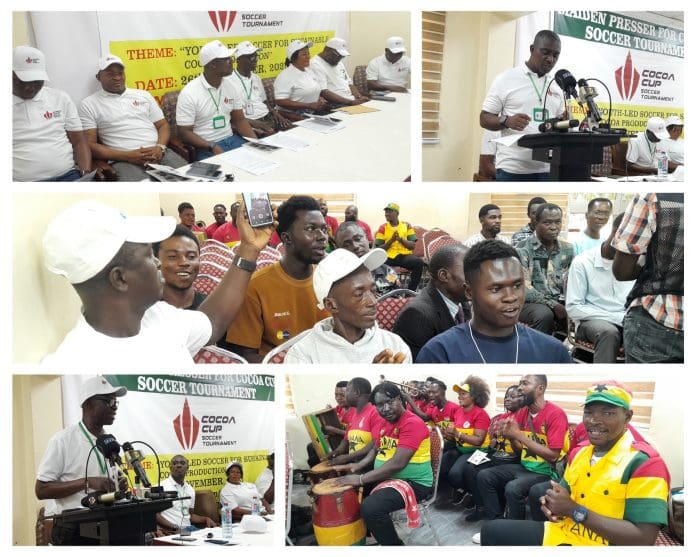
The Ghana National Cocoa Farmers Association (GNACOFA), in collaboration with the Africa for Glory Agenda, on Wednesday, November 26, officially launched the maiden edition of the Cocoa Cup Soccer Tournament at the Accra International Press Centre — a groundbreaking international football competition that promises a global spectacle merging the passion of the sport with the urgent call for sustainable cocoa production.
Set to take place in Brazil in March 2027, the tournament will convene clubs representing both cocoa-producing and cocoa-consuming countries under the theme “Youth-Led Soccer for Sustainable Cocoa Production.”
The event brought together journalists, cocoa sector stakeholders, youth groups, and members of the Ghana National Cocoa Farmers Association (GNACOFA), with keynote speeches delivered by Daniel Nana Osei Ampratwum, Tournament Project Manager and CEO of the Africa for Glory Agenda, and Ing. Stephenson Anane Boateng, Acting Board Chairman of the Cocoa Cup and President of GNACOFA.
Football as a Tool for Cocoa Advocacy
Ampratwum said the Cocoa Cup was designed to harness football’s global influence to educate consumers, especially the youth, about cocoa’s origins, its economic value, and the importance of sustainable sourcing.
“Football presents an unmatched opportunity to leverage its popularity and broad appeal to connect with consumers,” he said. “This approach is expected to stimulate demand and strengthen support for cocoa farmers and the entire cocoa sector.”
He added that the tournament would highlight critical issues in the cocoa industry—including land reclamation, farmers’ pensions, and child labour—while promoting a “Green Earth” agenda.
Although Australia will not play in the maiden edition, it will join as an official observer. Other proposed observing nations include Canada, Nigeria, Cameroon, India, Singapore, Luxembourg, and additional eligible countries.
The participating clubs were selected based on their home countries, resulting
in a lineup of teams representing three cocoa-producing and four cocoa-consuming nations.
Brazil Set to Host Historic Inaugural Tournament
Ampratwum described Brazil as the ideal host, calling it a “boutique producer-consumer nation” with strong infrastructure and deep cultural ties to football.
He reflected on cocoa’s history—citing Tetteh Quarshie’s legendary introduction of cocoa to Ghana and Sir Gordon Guggisberg’s role in mechanizing production—lamenting that some children in cocoa-farming communities still grow up without ever tasting cocoa products.
“This is an unfortunate reality we seek to correct, however trivial it may appear,” he said.
The project, he emphasized, will support consumers as much as producers, ensuring access to healthier cocoa products and boosting public health awareness of cocoa’s nutritional value.
Playoffs to Begin in Ghana in 2026
The tournament’s road to Brazil will begin with continental playoffs. In Ghana, the first match is scheduled for February 1, 2026, featuring arch-rivals Asante Kotoko and Accra Hearts of Oak
at a venue yet to be confirmed.
A proposed Ivory Coast playoff between Africa Sports and ASEC Mimosas is slated for March 1, 2026. Additional playoff schedules for Asia, Europe, South America, and North America will be announced to stakeholders.
Ampratwum said organizers had received “optimistic” responses from African clubs and expressed gratitude for the support of Opemsuo FM and the Kessben Group of Companies.
“With grace, courage and unity of purpose, we are certain that our efforts will not be defeated by circumstance,” he said.
GNACOFA: Cocoa Farmers at the Heart of the Initiative
In his address, GNACOFA President Ing. Stephenson Anane Boateng said cocoa remains one of Ghana’s most important export pillars, supporting 800,000 cocoa farm owners, 700,000 sharecroppers, and thousands of workers across nine regions.
Cocoa contributes about US$2 billion in foreign exchange annually, he noted, underscoring its role in Ghana’s GDP and rural development.
Boateng highlighted GNACOFA’s mission to represent small-scale cocoa farmers and promote unity, access to credit, improved production, and development in farming communities. With nearly 800,000 members, the association has become a significant force in shaping cocoa policy.
Youth Engagement and a New Era for Cocoa Farming
A key component of the tournament, Boateng said, is youth involvement. Seminars, symposia, and curtain-raiser youth matches will accompany each playoff across participating countries to encourage succession planning in cocoa farming.
GNACOFA has formed its own football team—GNACOFA Stars—to attract young talent, create pathways into cocoa farming, and support youth already in the sector.
“We are confident that this initiative will usher in a new era where cocoa farmers receive the recognition they deserve,” he said. “GNACOFA remains ready to collaborate with the Government of Ghana and COCOBOD to ensure that the cocoa sector remains a beacon of pride and prosperity.”
A Vision for Farmers, Consumers, and the Future
Both speakers stressed that the Cocoa Cup is more than a football event—it is a social, economic, and cultural intervention aimed at protecting cocoa farmers’ livelihoods while promoting global appreciation of cocoa.
The initiative includes advocacy efforts, research-driven awareness campaigns, and policy engagement to improve industry practices and strengthen the cocoa value chain.
As the presser concluded, Ampratwum reaffirmed organizers’ commitment:
“Long live the cocoa economy. Long live cocoa. Long live the Cocoa Cup Soccer Tournament.”
By Kingsley Asiedu
